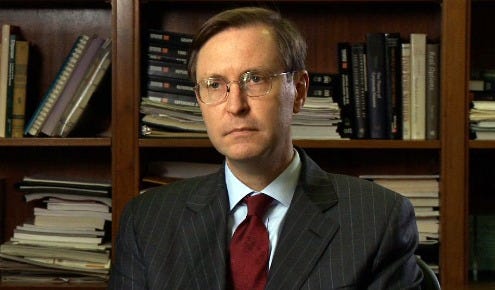Inside Job

What an angry, angry and opinionated documentary. Regular readers will know I prefer my docs rational and objective, favoring journalistic exploration of a topic over passionate diatribe.
But even though "Inside Job" belongs firmly in the latter category, it's still a highly illuminating look at the financial crisis of 2007-08, its causes and consequences.
It's easy to read news accounts about sub-prime mortgages and credit default swaps without ever really grasping what it's all about. Most people still don't, beyond a vague notion of "bad debt" bringing our economy to its knees.
Writer/director Charles Ferguson neatly lays out how our financial system has grown increasingly complex over the past 30 years, and how it was rigged to favor high-risk investments with little repercussions for those gambling with other people's money.
Unfortunately, the film also contains a lot of scattershot arguments, cheap theatrics and the unfair casting as dastardly villains of people like Lawrence Summers and Hank Paulson. The movie reaches a grubby low point when a Wall Street shrink testifies that the use of drugs and prostitution is rampant among his clients. (As opposed to, say, the entertainment industry?)
But there's enough clear-eyed elucidation to balance out the spit-flecked invective -- and perhaps even justify some of it.
A key piece of narration (by Matt Damon) introduces: "This is how it happened." But soon after comes this bit: "This crisis was not an accident." Together, they make clear that the motivation behind "Inside Job" is not just to explain, but to assign blame.
I think the movie nails the "how," but sputters aimlessly with rage on the "why." It's one thing to say that U.S. Treasury secretaries, Federal Reserve chairmen and bank CEOs were negligently careless in setting the economy up for a fall. It's another to suggest it was an intentional byproduct of their inherent greed.
Ferguson -- who also directed the similarly partisan "No End in Sight" about the Iraq war -- combines talking-head interviews featuring dozens of economists and experts with colorful graphs and charts to show us how the numbers stack up. To the titans of finance who claim this stuff is too complicated for regular folks to comprehend, the film makes its strongest argument simply by laying it all out in a clear, understandable format.
The short version includes something with the oxymoronic name of securitization. The rise of unregulated trading markets called derivatives allowed debt to be packaged and sold, and even bet on by third parties with no stake in the actual loans. The theory was that by spreading out the risk, it would help prevent economic downturns.
The only problem was, deregulation allowed companies to leverage their debt to dozens of times their assets, so even a slight dip in their valuation tipped companies like Lehman Brothers into bankruptcy. And since the people making the loans were disconnected from those on the hook if they defaulted, it incentivized things like home mortgages to people who clearly couldn't pay.
Ferguson also points fingers at the rating agencies like Moody's that gave the highest ratings to the companies holding the largest amount of debt. Since they made more money by giving out more and higher ratings, the supposedly impartial judges were complicit in the process.
The film takes an interesting look at the academic side, pointing out how so many economics professors at universities like Harvard and UC Berkeley make many times their annual salaries by consulting for finance companies. One encounter with a Columbia dean grows so acrimonious that he testily informs his interviewer he only has three minutes left, "So take your best shot."
By including these sorts of overheated moments, Ferguson devalues his own credibility as an arbiter of truth. He also doesn't help his case with title cards informing us of the many people who refused to appear on-camera, always preceded by a list of the millions of dollars they've made -- the clear implication being that they have something to hide.
Meanwhile, figures of dubious integrity like ex-New York Gov. Eliot Spitzer and financier George Soros are held up as unimpeachable sources.
I don't care for Ferguson's methods, but I can't deny the powerful clarity of the message "Inside Job" delivers. We live in an economic climate where the people making all the decisions are completely sheltered from any consequences if they guess wrong.
It's a nasty game, and a rigged one.
4 Yaps



